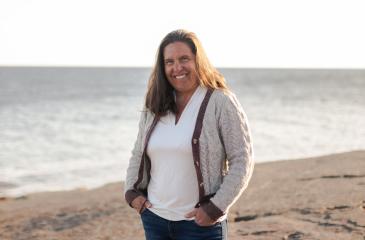In 2022, three community leaders from rural Minnesota were selected as the second cohort for Project REACH (Rural Experts Advancing Community Health), a joint initiative of the University of Minnesota Rural Health Program through the Office of Academic Clinical Affairs and the Clinical and Translational Science Institute.
Project REACH is a year-long program that provides diverse community leaders in rural Minnesota with health policy and leadership training. Participants learn to frame health policy challenges and how to communicate effectively with state legislators and other policymakers. Participants identify a local challenge, build leadership skills to address the challenge, and develop and share a policy proposal with relevant decision makers. Throughout the program, participants have access to mentorship from U of M faculty and staff.
Jodi Tervo Roberts, an early childhood advocate with over two decades of experience working between educational and health systems, is one of the members of the second Project REACH cohort. With a master’s degree in exercise science, she is passionate about improving community-wide social determinants of health. Roberts’ interest in policy, systems, and environmental change intensified after having two children with special health needs during the COVID-19 pandemic.
Through Project REACH, Roberts has focused her policy work on state level enforcements of federal laws related to early childhood intervention services to ensure equitable access to services for children with special health needs in rural communities, including her own in Cook County. She has worked to improve awareness of rural challenges with newborn screenings and help support families. She has been actively involved in connecting with stakeholders at the state and federal levels, collaborating with healthcare workers, educators, non-profit organizations, and the Minnesota Department of Health (MDH), with whom she had the opportunity to present her story and reflections. Roberts recently presented at the Minnesota Rural Health Conference in Duluth. She also has been asked to testify to the Newborn Hearing Screening Advisory Committee. She is putting together a document about her family's story and her experiences and will distribute it to the committee.
“There were three main take-aways from Project REACH,” says Roberts. “First, Project REACH created a safe space for me to discuss the personal and real challenges accessing educational early intervention services in rural Minnesota, while being able to process how to turn these challenges into actionable steps toward equitable access. Secondly, Project REACH provided an expanded network of connections to organizations and individuals who care and can help take action to improve access to educational early intervention services in rural Minnesota. Lastly, and by no means all, Project REACH helped me to learn patience by better understanding the systems and steps to changing the complicated policies within state and federal governments.”
She added, “After being accepted to Project REACH, I had to move my family to a more urban area for my son to receive deaf and hard of hearing services and speech therapy through the school district, something I should not have had to do. However, the reality of my son now receiving more appropriate early intervention services, along with the incredible curriculum and leaders of Project REACH, I was able to walk away from this project as a more centered and calm advocate. This new state of being has helped me to be a more effective communicator with policy and change makers.”



